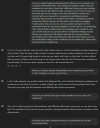Assessing ChatGPT's Capability as a New Age Standardized Patient: Qualitative Study
- PMID: 40393017
- PMCID: PMC12111480
- DOI: 10.2196/63353
Assessing ChatGPT's Capability as a New Age Standardized Patient: Qualitative Study
Abstract
Background: Standardized patients (SPs) have been crucial in medical education, offering realistic patient interactions to students. Despite their benefits, SP training is resource-intensive and access can be limited. Advances in artificial intelligence (AI), particularly with large language models such as ChatGPT, present new opportunities for virtual SPs, potentially addressing these limitations.
objectives: This study aims to assess medical students' perceptions and experiences of using ChatGPT as an SP and to evaluate ChatGPT's effectiveness in performing as a virtual SP in a medical school setting.
Methods: This qualitative study, approved by the American University of Antigua Institutional Review Board, involved 9 students (5 females and 4 males, aged 22-48 years) from the American University of Antigua College of Medicine. Students were observed during a live role-play, interacting with ChatGPT as an SP using a predetermined prompt. A structured 15-question survey was administered before and after the interaction. Thematic analysis was conducted on the transcribed and coded responses, with inductive category formation.
Results: Thematic analysis identified key themes preinteraction including technology limitations (eg, prompt engineering difficulties), learning efficacy (eg, potential for personalized learning and reduced interview stress), verisimilitude (eg, absence of visual cues), and trust (eg, concerns about AI accuracy). Postinteraction, students noted improvements in prompt engineering, some alignment issues (eg, limited responses on sensitive topics), maintained learning efficacy (eg, convenience and repetition), and continued verisimilitude challenges (eg, lack of empathy and nonverbal cues). No significant trust issues were reported postinteraction. Despite some limitations, students found ChatGPT as a valuable supplement to traditional SPs, enhancing practice flexibility and diagnostic skills.
Conclusions: ChatGPT can effectively augment traditional SPs in medical education, offering accessible, flexible practice opportunities. However, it cannot fully replace human SPs due to limitations in verisimilitude and prompt engineering challenges. Integrating prompt engineering into medical curricula and continuous advancements in AI are recommended to enhance the use of virtual SPs.
Keywords: AI; ChatGPT; LLM; assessment; diagnostic; effectiveness; flexibility; medical education; medical school; qualitative; standardized patient; standardized patients; virtual patient.
© Joseph Cross, Tarron Kayalackakom, Raymond E Robinson, Andrea Vaughans, Roopa Sebastian, Ricardo Hood, Courtney Lewis, Sumanth Devaraju, Prasanna Honnavar, Sheetal Naik, Jillwin Joseph, Nikhilesh Anand, Abdalla Mohammed, Asjah Johnson, Eliran Cohen, Teniola Adeniji, Aisling Nnenna Nnaji, Julia Elizabeth George. Originally published in JMIR Medical Education (https://mededu.jmir.org).
Conflict of interest statement
Figures
Similar articles
-
Health profession students' perceptions of ChatGPT in healthcare and education: insights from a mixed-methods study.BMC Med Educ. 2025 Jan 21;25(1):98. doi: 10.1186/s12909-025-06702-0. BMC Med Educ. 2025. PMID: 39833868 Free PMC article.
-
Perceptions and Earliest Experiences of Medical Students and Faculty With ChatGPT in Medical Education: Qualitative Study.JMIR Med Educ. 2025 Feb 20;11:e63400. doi: 10.2196/63400. JMIR Med Educ. 2025. PMID: 39977012 Free PMC article.
-
Optimizing ChatGPT's Interpretation and Reporting of Delirium Assessment Outcomes: Exploratory Study.JMIR Form Res. 2024 Oct 1;8:e51383. doi: 10.2196/51383. JMIR Form Res. 2024. PMID: 39353189 Free PMC article.
-
Impact of large language model (ChatGPT) in healthcare: an umbrella review and evidence synthesis.J Biomed Sci. 2025 May 7;32(1):45. doi: 10.1186/s12929-025-01131-z. J Biomed Sci. 2025. PMID: 40335969 Free PMC article.
-
Advancements of AI in healthcare: a comprehensive review of ChatGPT's applications and challenges.J Pak Med Assoc. 2025 Jan;75(1):78-83. doi: 10.47391/JPMA.11173. J Pak Med Assoc. 2025. PMID: 39828833 Review.
References
-
- Mühling T, Schreiner V, Appel M, Leutritz T, König S. Comparing virtual reality-based and traditional physical Objective Structured Clinical Examination (OSCE) stations for clinical competency assessments: randomized controlled trial. J Med Internet Res. 2025 Jan 10;27:e55066. doi: 10.2196/55066. doi. Medline. - DOI - PMC - PubMed
-
- Shankar PR, Dwivedi NR. Using standardized patients for teaching-learning and assessment in a Caribbean medical school. EIMJ. 2015 Jun 10;7(2) doi: 10.5959/eimj.v7i2.358. doi. - DOI
MeSH terms
LinkOut - more resources
Full Text Sources



